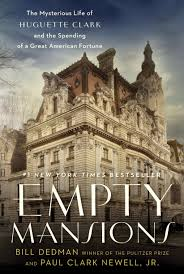Empty Mansions, the Mysterious Life of Huguette Clark
and the Spending of a Great American Fortune, by Bill Dedman and Paul Clark
Newell, Jr.
The sub-title of this work is a bit misleading, for the first part is about the amassing of a great fortune by the American copper baron W. A. Clark, whose name was not familiar to me, though I know now that he was one of the great multi-millionaires of the so-called "Gilded Age," that period in American History between 1890-1910, when so many huge fortunes were made and ostentation became the watchword among the super-rich.
William Clark personified the American rags-to-riches story; a young miner/entrepreneur from Pennsylvania, he settled in Montana, discovered a rich copper vein near the town of Butte, and the rest is history. At the height of his success in the early 20s, his income was said to have exceeded ten million a year, of which he and his first wife managed to spend only three million, living in the most lavish of life styles. After marrying his childhood sweetheart and siring five children, his domestic world took a tumble when his beloved wife died at the age of fifty and he re-married a young woman half his age, who gave him two more children, both born and reared in Paris, Andree and Huguette. Huguette, the principal subject of this work, became the last survivor of her generation of Clark children, living to the age of 105, in an unbelievable world of riches and ultimate seclusion.
Unlike the first Mrs. Clark, Anna, Huguette's mother, became a sophisticated, cosmopolitan woman, though somewhat reclusive by nature. She could well afford to be. After the death of William Clark and the sale of their one hundred room mansion on 5th Ave., Anna gave private musical soirées at her vast apartment, founding what became known as the "Paganini Quartet," and providing individual Stradivari instruments for each of the players. At her death she bequeathed the rest of her personal fortune to Huguette, her one surviving daughter, who had already inherited one-fifth of her father's estate as one of his five surviving children.
Although briefly married to a member of the French aristocracy, Huguette lived most of her life in solitude, giving away vast amounts of her fortune to friends and even deserving strangers, but as she aged, she outlived most of her own support system and became more and more reclusive. Even her own business staff became accustomed to dealing with her only by memo and telephone. She was always remembered as intelligent and gracious but generally unavailable in person.
Ultimately she wound up very ill and virtually unattended in her own sumptuous 5th Ave apartment, where she was discovered and rushed to Doctors Hospital, a swank Manhattan institution, a place she willingly and preferably remained for the next twenty years!
This book is well documented, both from primary and secondary sources, but it is a collaboration and ultimately lacks the style of a single author. Yet it is such a compelling story that one reads on, hoping to untangle the mystery of Huguette Clark's complex personality.
One never does, but it's still worth the read!

Loving the book!
ReplyDelete